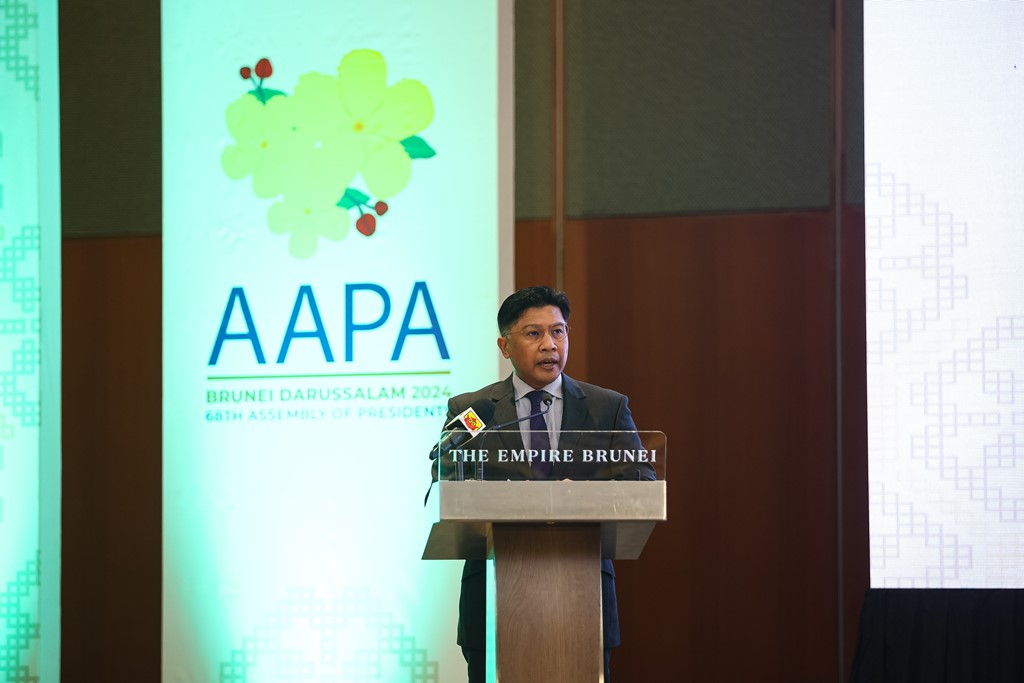The aviation industry is at a pivotal moment as it faces ambitious targets, including achieving net-zero carbon emissions by 2050 and the Association of Asia Pacific Airlines’ (AAPA) aim for 5 per cent sustainable aviation fuel (SAF) use by 2030, said Minister of Transport and Infocommunications Pengiran Dato Seri Setia Shamhary bin Pengiran Dato Paduka Haji Mustapha.
“These are not mere aspirations but obligations that call for collective innovation and commitment at every level,” the minister stressed during the opening ceremony of the 68th AAPA Assembly, officiated on Wednesday.
This year’s assembly is particularly significant, coinciding with the 80th anniversary of the Chicago Convention—a historic milestone that laid the groundwork for global civil aviation and established the International Civil Aviation Organisation (ICAO).
Since its inception, the Chicago Convention has brought nations together to ensure safe, efficient, and equitable air transport, setting the framework that continues to guide the industry. “Air transport has long been a crucial connector, linking people and places around the world, even in the most remote communities,” said the minister. He noted that the role of aviation was further highlighted during the pandemic, when the industry was vital in transporting essential goods and safely repatriating people amidst unprecedented challenges.

The minister pointed out that the aviation industry is undergoing transformative changes driven by technological advancements, shifting geopolitical dynamics, and a renewed emphasis on sustainability. These changes, he said, will redefine how people travel, conduct business, and connect globally.
“The theme of this assembly, ‘Jetting Into 2050: Future Proofing Asian Aviation,’ is fitting,” said Pengiran Dato Seri Setia Shamhary. He noted that the post-COVID era has been a period of recovery, with 2024 witnessing strong growth in international air travel and cargo. Total global air passenger traffic has already matched and surpassed pre-pandemic levels from 2019. According to the International Air Transport Association (IATA), global passenger numbers are expected to grow by an average of 3.8 per cent annually, with the Asia Pacific region projected to account for more than half of the net increase over the next 20 years.
“The focus on the future invites us to address challenges and opportunities as we shape a resilient and sustainable aviation sector in the Asia Pacific. This includes adopting technologies that make air travel more seamless and passenger-friendly,” he said. “We must harness the transformative potential of technology, sustainability, and passenger-centric innovation.”
The minister also highlighted the need to address supply chain challenges affecting the timely delivery of aircraft, engines, and essential components. He emphasised the importance of recognising that airlines are at different stages of their decarbonisation journey, with technological innovation and sustainable aviation fuel being crucial for achieving these goals.
“As we strive for a decarbonised aviation sector, pragmatism and collaboration in sharing knowledge, technology, and resources are essential,” he said. He noted that Brunei Darussalam, through the Department of Civil Aviation, has developed the Brunei Darussalam Action Plan on the Reduction of Aviation Emissions, which outlines strategies to reduce CO2 emissions from international flights, supplemented by airport improvements.
The minister outlined key initiatives under four main areas: Operational Measures, Technology, Market-based Measures, and Sustainable Aviation Fuel. He stressed that the assembly provides an invaluable platform for exchanging insights, formulating effective strategies, and fostering partnerships to address the challenges facing the industry. – LYNA MOHAMMAD




